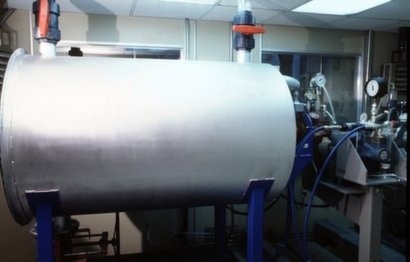
DECC has released its annual Digest of United Kingdom Energy Statistics (DUKES) which shows a surge in AD capacity outside the water industry from 164MW in 2013 to 216MW (32 per cent) in 2014. Analysis from the Anaerobic Digestion & Bioresources Association (ADBA) shows these plants generated 40 percent more electricity in 2014 than in 2013, more than was generated from sewage sludge in the water sector and for the first time breaking past 1TWh of electricity.
The surge reflects a doubling in the number of farm-based AD plants to 147 and an increase in AD capacity for food waste highlighted by ADBA’s Market Report, published at the beginning of July. The report also showed that there has been a real surge in deployment of biomethane plants generating gas for the grid in 2014-2015. This isn’t yet reflected in the DECC figures but ADBA expects the 2015 statistics to highlight the growth from additional biomethane production.
“The 40 percent leap in electricity generated by anaerobic digestion electrical capacity outside of the water industry in 2014 shows how the UK’s AD market has taken off over the past year” said ADBA’s Chief Executive, Charlotte Morton. “While the surge in biomethane this year won’t be apparent until DECC publish their 2015 DUKES report, the overall growth in electrical capacity reflects the significant contribution the AD industry is now delivering towards the UK’s energy needs. As intermittent renewables such as wind and solar supply more of our electricity, AD complements their output through the generation of low carbon baseload or dispatchable power, helping to ensure we meet peaks in demand.”
However, Ms Morton added that the strong progress is now at serious risk as a result of recent hostile government policy, including the surprise £11 million cut announced in the Chancellor’s Summer Budget, plus uncertainty over the future of the Renewable Heat Incentive (RHI) beyond next year. Other areas of concern include the sudden review of pre-accreditation in the Feed-in Tariff and ongoing cuts to incentive levels. Ms Morton said that without support to continued development, the AD industry will be unable to contribute to critical government targets.
The AD industry has the potential to meet 30 percent of UK domestic gas demand, reducing greenhouse gas emissions by 4 percent and improving energy security by reducing reliance on energy imports. It also enables farmers to remain in the farming industry by offering opportunities for diversification and low-carbon biofertiliser while also creating 30,000 jobs. At present, the AD industry is focusing on improved performance and cutting costs in order to ensure a major contribution to the UK bioeconomy, potentially worth £100 billion. However, in order to achieve that it will need continued government support.
For additional information:

